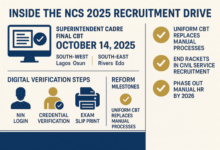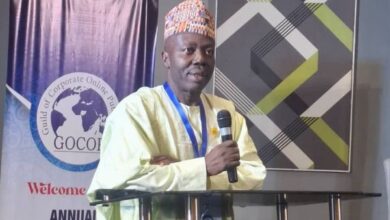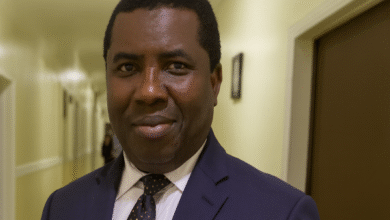Unpaid Salaries: Civil Servants do menial jobs, beg for money, report to work with Gari to survive
Civil servants in Oyo, Osun, Cross River, Rivers, Abia, Benue, Plateau and Bauchi states have adopted different strategies to survive months of unpaid salaries in their states.
The strategies include begging for money from friends and relatives, securing loans from different sources and doing menial jobs to survive.
Some state governments, especially those led by the opposition All Progressives Congress and the Federal Government have been trading blame over the unpaid salaries of workers.
While the states attributed the development to the drop in federal allocations to them, the Minister of Finance, Ngozi Okonjo-Iweala, accused them of not prioritising salary payments.
In Oyo State, for instance, where the government has not paid salaries for three months, some civil servants skip their lunch daily.
A few others, it was gathered, however report to their duty posts with garri and groundnuts which serve as their lunch.
One of them told The PUNCH at the state secretariat in Ibadan that the state government gave them reasons for the non-payment of their salaries.
He said, “My colleagues are not happy because of the situation. Some of them now skip lunch break because they have no means to observe it.
“I have seen some junior workers taking garri and groundnuts as lunch. We have been told that dwindling allocation from the Federal Government was responsible for the salary delay. We hope for a change when(Muhammadu) Buhari takes over.”
A vice-principal in one of the secondary schools in Ibadan also told one of our correspondents that it had become a habit for some teachers to ask him for money every day.
He said, “My teachers come to me for money every day but I don’t have enough to give to them. I rely on my wife’s business to keep my home running.I have three children in tertiary institutions and one of them is now at home.
“We only hope that the Federal Government will sort out whatever the problem is and increase what the states get as allocations.”
A secondary school teacher also lamented the development, saying that some of her colleagues who have cars no longer drive them to school.
She said, “Those of us who do not have cars used to rely on our senior colleagues who have to take us to our nearest bus stops. But now, we walk to the bus stops because they no longer bring their cars to school due to the high cost of fuel.”
A non-teaching staff in one of the schools in the city, said he had resorted to taking loans from a cooperative society which he is a member.
“I took a loan from my cooperative society for the repair of my roof but when salaries did not come, I started spending it on transport to my office.”
The non-payment of salaries by the Osun State Government for the past six months has also forced many civil servants into ‘forced fasting’ and selling jewellery as well as household appliances.
Our correspondent in the state gathered that some of the workers who had part time business were now paying more attention to them than before.
Some of the workers also do not go to work more than twice or three times in a week due to lack of funds.
A local government worker, who identified herself simply as Kemi, said, “ We have a roster in my office. We rotate it among ourselves, some would go on Mondays and others on Tuesdays. I don’t go to the office more than once in a week because of lack of transport fare.”
The case of Cross River State workers is no less different. Some of them, who are owed between two and six months’ salaries, told The PUNCH that apart from getting loans from private individuals and financial institutions, they beg for foodstuffs from their relatives and friends.
A director in the state Ministry of Information, said, “It is different strokes for different folks. Some people get support from their relatives and the well-to-do who understand their plight. Others borrow to make ends meet, especially to pay the school fees of their children and wards.
“For instance, the state government is guaranteeing soft loans from one of the new generation banks in the state. We apply for the loans and the government guarantees them.”
Also, the chairman of the state University of Science and Technology branch of the Academic Staff Union of Universities, Steve Ochang, said lecturers were given soft loans to survive the almost six months of unpaid wages.
A worker with the state Ministry of Education, who asked not to be named, said, “ They have turned us to beggars. We have not been paid for months now and this has made some of us to be begging for food items. This government has not been treating us well. They are making us to lose our dignity as breadwinners of our families.”
The Chairman of the state Trade Union Congress, Clarkson Otu, said it was regrettable that the outgoing Liyel Imoke administration did not keep to its promise of paying all outstanding salaries on May 5.
He said, “Part of our agreement was that government would pay the March salareis on or before May 5. The governor promised to do all within his power not to leave any wage unpaid. He said this during the Workers’ Day on May 1.
“Unfortunately, he has not kept to his promise. How can he now meet up all the payments before May 29? We will ensure they feel our anger if they fail to pay us our accumulated wages.”
Otu also confirmed that many civil servants had become debtors following the development.
In Plateau State, striking civil servants said that their survival had been at the mercy of God.
It was gathered that some of them had taken to menial jobs to raise money to feed their families while some had turned their children and wards to hawkers.
One of the workers said, I work in the Ministry of Health but it has not been easy for many of us who are not professionals to survive because we are being owed for many months. Some of us have taken to doing menial work like cleaning the homes of some rich people in order to maintain our families. But I help my big friends to do laundry work every weekend in order to raise money.”
The Chairman of the state chapter of the NLC, Jibrin Bancir, said that some of them had borrowed beyond their limits from different sources.
He said, “We are in the hands God. It is not true that government is making efforts to pay. In the last six months, they have been going to Federation Account Allocation Committee meetings and they have not paid for even one month salary . They have defaulted six months in a row.”
Some workers in Abia State parastatals also expressed displeasure over their unpaid wages and appealed to the outgoing Theodore Orji government for quick intervention.
An employee of the state Universal Basic Education Board in Umuahia, who said they had not been paid for the past six months, stated that they had been surviving “by the grace of God.”
He said he had to start up a “ small business centre where I do some photocopying works to keep body and soul together.’’
Similarly, another worker with the ASUBEB said she had been “living on credit.”
She said, “I have a huge debt and more than four members of my colleagues have died because they could no longer cope.”
When contacted, the state Commissioner for Information and Strategy, Anthony Agbazuere, said the government had always rationalised its resources in such a way that no civil servant in the Ministries was being owed.
He however pleaded with workers in the parastatals to exercise a little patience as their salary arrears would be paid as soon as the state’s revenue improved.
A civil servant in Benue State who identified himself simply as Mr. Agber said the state government only paid workers in the state in January this year.
Agber, who described the non-payment of salaries as unprecedented, said many workers had resorted to part-time jobs to make ends meet.
He said , “We started collecting half of our initial salaries; and it got worse this year as we have not been receiving other entitlements.
A teacher with the State Universal Basic Education Board in Makurdi, who identified himself as Akpen Peter, said, “This year, we have not received any salary. The government is also owing us the salary of May last year. We have been doing our work. We would have protested but this has not proved to be a good strategy.We are hoping and praying that the incoming government would address our plight.”
In Rivers State, a worker, who identified herself as Happiness, said she was being owed eight months salary arrears.
Happiness, an assistant to a top state government functionary, explained that she tried selling clothes to make ends meet.
“It has not been easy because even my clothes business has collapsed because civil servants, who are mostly my customers could not pay me. The government is owing them two-month salaries.”
But Mr. Christian Naku, who is a teacher in one of the state-owned model schools, said teacher were being owed two months salaries.
She added that she had been relying on her brothers and other relatives in the private sector to survive.
In Bauchi State, civil servants described as demoralising, the failure of the government to pay them.
They wondered why the government claimed not to have money when it was collecting its allocations from the federal account regularly.
A civil servant with the state Ministry of Information, who spoke on the condition of anonymity, said, “It is wrong for the state government not to have paid us.
“Sincerely, the situation is too difficult for us to bear because we usually get our salaries before the end of every month but there are no signs now that we will be paid soon.
“This is strange to us; we don’t know what is happening. We can hardly survive.”
He called on “Governor Isa Yuguda to please pay us our April salaries and the arrears of our January salaries before the end of his tenure.”
He explained that the government “divided our January salaries into 10 parts and has so far paid us in only two instalments.”
A secondary school teacher, who decried the situation, said, “We are not finding things easy because we can barely feed our families.
“In fact, I have taken my family to the village for now until the situation becomes better. I can’t cope with the high cost of living in the town.
“How much do the entire teachers in the state earn that they can’t pay? What are they doing with our money?
Another teacher said he had resorted to borrowing money from people close to him.
“I’ve been expecting salaries and since they are not forthcoming, I have to go to business people that I know to lend me money,” he said.
The NLC in the state said it had issued an ultimatum to the government to pay the workers on Tuesday(today).
Its chairman, Hashimu Gital, said, “Workers deserve to be paid their salaries and the government has up to Tuesday (today) to do so, otherwise, we will be left with no choice but to withdraw our services.
“We will embark on an indefinate strike until all workers in the state are paid their salaries including the 2, 700 SUBEB teachers who were disengaged and re-engaged. Their nine-month salaries must be paid.”
In Edo State where some employees, under the Coalition of Unions of State-owned Tertiary Institutions and the Judicial Staff Union of Nigeria are presently on strike, the government said on Monday that it was “up-to-date” in salary payments.
The state Commissioner for Information and Orientation, Louis Odion, in a statement made available to one of our correspondents on Monday, described a report which listed Edo as one of the states owing its workers as “shocking, misleading and mischievous.”
Odion’s statement read, “We read with deep shock, claims that the government of Edo State owes workers five months salary arrears. Nothing could be more misleading and mischievous.
“For the records, Edo State Government does not owe workers salary arrears, as the government has fully discharged its obligations. As a matter of state policy, since 2008, pensioners receive their pay first, followed by workers who get paid not later than the 25th of every month. The policy has not changed.”
Meanwhile, the Ekiti State Government has said it will begin the verification of its 48,977 workers on Tuesday(today).
It said the exercise would end on Monday next week after which the payment of April salaries would begin on Wednesday.
The Special Assistant to the State governor on Public Communications and New Media, Lere Olayinka, made this known in a statement on Sunday.
Olayinka explained that the verification was aimed at saving about N500m being lost to ghost workers monthly through the e-payment system.
The statement read in part, “Those insinuating that the verification was meant to delay payment of April salaries are just playing cheap politics because the arrangement is such that the moment the verification is concluded on a daily basis, salaries of those cleared would be paid.
“The implication of this is that those verified on Tuesday, May 12 will receive their April salaries on Wednesday, May 13 while those verified on Wednesday will get paid on Thursday. By Friday, May 14, 70 per cent of the workers would have received their April salaries.
“From Tuesday to Wednesday, staff of core Ministries, Departments and
Agencies, Health Management Board and six local councils will be verified at designated venues.
Buhari may inherit N50bn salaries, allowances
Meanwhile, the Association of Senior Civil Servants of Nigeria has called on President Goodluck Jonathan to ensure that “all outstanding salaries and allowances owed public servants are settled before his exit on May 29, 2015.”
The association, in a statement titled “Pay Outstanding Workers Salaries/Allowances,” faulted the claim by Okonjo-Iweala that the government was not owing its workers.
Although the ASCSN statement did not contain the amount owed the workers, The PUNCH gathered exclusively from the association’s Secretary-General, Alade Lawal, that it was in the range of N50bn.
The ASCSN said the demand for the payment was to allow the incoming administration to start on a clean slate in terms of payment of staff emoluments.
Some of the allowances and arrears were inherited from successive governments and have not been settled since 2007.
For example, the salaries of some workers in federal ministries, departments and agencies for the months of July, August, September and October 2013 have not been paid because their names were omitted on the payrolls.
“In the Federal Ministry of Education alone, the arrears of allowances are running close to N2bn while that of Ministry of Defence are close to N1bn,” the association said.
The ASCSN said, “We urge Mr. President to do the needful by ordering thorough investigation with a view to paying all outstanding salaries and allowances to the affected officers before he leaves office on May 29, 2015.
“This will not only allow the incoming administration start on a clean slate in terms of payment of staff emoluments but also further boost the image of Mr. President as a statesman.
“The outstanding allowances owed thousands of public servants include promotion arrears since 2007 to date, first 28 days in lieu of hotel accommodation, Duty Tour Allowance, mandatory training allowance organised by the Office of the Head of Service of the Federation in 2010, burial expenses and repatriation allowance.
“We believe that if Mr. President can pay these outstanding legitimate salaries and allowances to thousands of public servants, he would not only endear himself to the public service employees but also leave his footprints on the sands of time. If he leaves office without paying, public servants will surely have a different impression of him.”
NLC dispatches task force to states
The NLC has however dispatched members of its task force to states to ascertain the number of states owing workers.
Its General Secretary, Peter Ozo-Esan, told one of our correspondents on Monday that the members of the task force entrusted with the responsibility of resolving the issue of outstanding salaries were sent out on Monday.
Ozo-Esan said the NLC would decide the next line of action after getting reports from the members in the states.
He said that the National Administrative Council set up a task force entrusted with the responsibility of looking into the payment of workers’ salaries in the states in each of the six geopolitical zones.
The NLC chief said, “ Several teams have been dispatched to the states to verify those that are owing. Until we get feedback from the team members, we cannot give you the states that are owing.
“We don’t speculate on issues like this and that is why we are saying that we should hold on briefly for the team members to do their work and give us feedback.
“It is after the teams have done their work and submitted their reports that the NLC would decide on the next line of action.”
#Punch#












